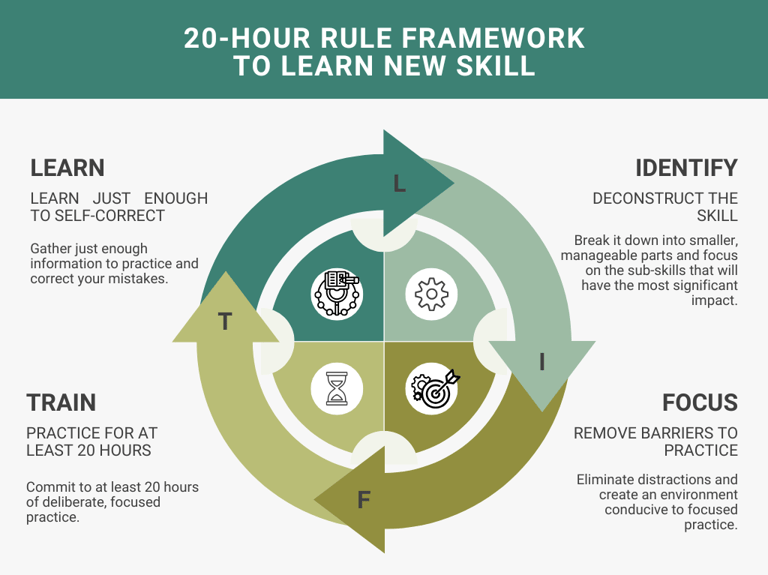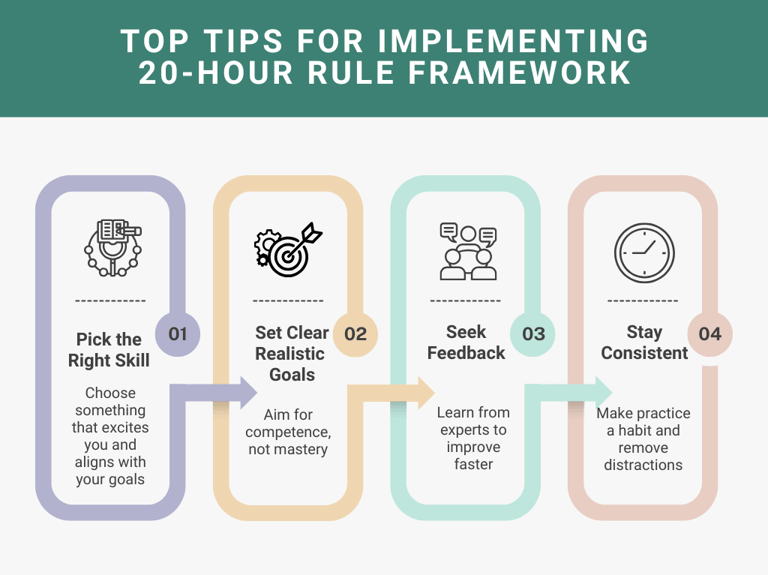The 20-Hour Rule
Your Secret Weapon for Gaining New Skills in Business
Kat Aftyka
3/16/2025


I recently stumbled upon an old TED talk that I had watched years ago about how to learn anything in 20 hours. At the time, it seemed like an interesting concept for things like learning to play instrument or get the basis of language for holidays in Spain, but now, with the ever-accelerating pace of change around us, I found myself looking at it from a completely different perspective. Change has become the new constant, and adaptability and learnability have emerged as our superpowers. This led me to ponder: could the 20-hour rule be our ace up our sleeve when it comes to quickly mastering new skills in the business world? As with most things, the answer is nuanced.
The 20-hour rule, popularized by Josh Kaufman, suggests that you can go from knowing nothing to being reasonably competent at a new skill with just 20 hours of focused practice. This is not about becoming an expert but about reaching a level of proficiency that allows you to perform the skill effectively. In a business environment, this can be incredibly useful when time is of the essence.
So, what are the steps Kaufman presents in his approach?
1. Deconstruct the Skill
Break down the skill into smaller, manageable parts. Focus on the sub-skills that will give you the most significant impact. For example, if you're learning to use new software, you might start with the basic functions you'll use most frequently.
2. Learn Enough to Self-Correct
Gather just enough information to be able to practice the skill and correct your mistakes. This means understanding the fundamentals but not getting bogged down in details. You need to be able to recognize when you're doing something wrong and know how to fix it.
3. Remove Barriers to Practice
Eliminate distractions and make it as easy as possible to practice. This might mean setting aside a specific time each day, creating a dedicated workspace, or even turning off your phone. The key is to create an environment where you can focus entirely on the skill. And let’s be honest – removing barriers and becoming in-distractable is another super skill to have in our busy world.
4. Practice for at Least 20 Hours
Commit to practicing for at least 20 hours. This is the minimum amount of time required to see significant improvement. Remember, these hours should be focused and deliberate, not just mindlessly going through the motions.
I have created an acronym to remember it better:
🔹 L – Learn just enough to self-correct
🔹 I – Identify key sub-skills to focus on
🔹 F – Focus by removing distractions
🔹 T – Train consistently for at least 20 hours
While Kaufman's framework is a great starting point, it does omit one crucial factor that matters for me when I am obtaining a news skill: the usefulness or personal investment in the skill. In other words – if I am learning something that will provide immediate rewards—such as helping me complete my work more efficiently or contributing to an important project— I am more likely to stick with the framework. For example, discovering how AI accelerates the outputs at my work, encouraged me to learn how to prompt better. On the other hand, if the skill is something you thought would be nice to have but don't feel passionate about or is an unwanted branch of the project you are in, it will be harder to stay committed. Therefore, the choice of the skill to which we would like to apply the 20-hour rule makes a difference, this is why it is my number 1 tip for implementing the framework.
It's also important to be aware of some common misconceptions about the 20-hour rule. Firstly, you will not become a master in 20 hours. This rule is about gaining competence, not expertise. Secondly, the quality of those 20 hours matters. Focused, deliberate practice is essential. Finally, this rule may not be applicable to all skills. Some skills, particularly those that are highly complex or require a lot of background knowledge, may take longer to learn.
Top tips for implementing 20-hour rule
So, how can you enhance your chances of success with the 20-hour rule? Here are a few techniques:
Choose the Skill that Matters Most
Focus on a skill that will have a direct and significant impact on your work or personal goals. This will keep you motivated and invested in the learning process. Having skin in a game helps sticking with it and so does instant feedback loop in terms of reward.
Set Clear Goals
Define what you want to achieve with the skill and set specific, measurable goals. This will give you a clear target to aim for and help you track your progress. Additionally, if you connect obtaining the skills as a steppingstone for achieving a bigger goal in your life, the more motivated you become.
Seek Feedback
Get feedback from others who are more experienced in the skill. This can help you identify areas for improvement and accelerate your learning. Also the advice from the others that have just been through the learning journey, can help you concentrating on the elements that will move the needle the most.
Stay Consistent
Practice regularly and consistently. Even short, daily practice sessions can add up over time and lead to significant improvement. It is back to habit building and orchestrating the environment to work for you in learning the skill.
By following Kaufman's framework and incorporating some of my tips, you can make the 20-hour rule an effective tool for quickly gaining new skills in the business environment. Remember, the key is to stay focused, practice deliberately, and choose skills that genuinely matter to you. With time and dedication, you can adapt to the ever-changing landscape of business and stay ahead of the curve.




